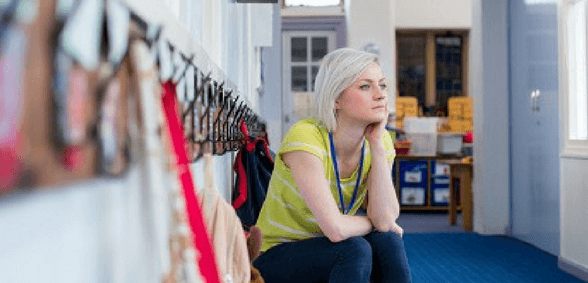
CREDIT: This story was first seen in Tes
Hundreds of thousands of female pupils have suffered sexual harassment at school and the government is under mounting pressure to take action, Tes reports.
Almost four in 10 female pupils have suffered sexual harassment at school, in some cases amounting to sexual assault, in an education system where sexism is “endemic” and misogynistic language routinely used, new research warns.
The study, commissioned by the NEU teaching union and UK Feminista, a gender equality campaign group, was done by the Institute for Employment Research at the University of Warwick.
It reveals how 37 per cent of female secondary school pupils have suffered some form of sexual harassment at school. There are 1.4 million girls aged 11 to 15 in state-funded secondary schools in England.
The research, based on surveys with 1,508 secondary school pupils and 1,634 teachers at secondary and primary schools in England and Wales, shows that girls are six times more likely than boys to have been sexually harassed at school. Six per cent of boys report having experienced sexual harassment.
The report described sexism in schools as “endemic”. It stated that almost a quarter (24%) of female pupils had been subjected to “unwanted physical touching of a sexual nature” while at school.
It adds that “sexual harassment is highly prevalent in schools” and has been experienced or witnessed by more than half (58%) of female pupils.
“Boys often lift skirts up and whistle and treat girls in a sexual manner and nothing gets done about it,” one girl, who took part in the research, said.
The government has said that it will be publishing detailed advice this term addressing sexual violence and sexual harassment between children in schools.
Female teachers targeted
The report found that sexual harassment also affects teachers. One anonymous secondary school teacher said: “Female teachers have been sexually assaulted by male pupils in corridors and classrooms. This often happens when there’s a crowd or disruption so that they are more likely to get away without getting caught or identified.”
Almost one in three (32%) teachers in mixed-sex secondary schools witness sexual harassment in their school on at least a weekly basis. A further 36 per cent say they witness it on a termly basis. This comes just months after Tes revealed the scale of sexual abuse in schools.
Yet there is a “vicious cycle of under-reporting of sexism in schools” according to the report. One reason is that pupils do not believe teachers “would take reports of sexism and sexual harassment seriously”. Sexism and sexual harassment in schools “has been normalised” and fewer than one in seven pupils who have been sexually harassed report it to a teacher.
More than one in four (27%) of secondary school teachers admit they would not feel confident tackling a sexist incident, states the report. “Teachers do not know what to do. Teachers desperately need training on how to respond to sexism and sexual negativity,” according to one secondary school teacher quoted in the report.
They comment: “I have seen boys mime raping girls and just been kept back at lunch for a detention, no explanation given to them other than when I made myself involved”.
‘Zero tolerance’
Schools need to take a “zero-tolerance approach to sexual harassment” and “adopt a ‘whole-school approach’ to tackling sexism,” the report recommends.
It calls on the government to issue guidance on sexual harassment and sexual violence, set up a fund to support organisations working with schools to tackle the problem and ensure the sex and relationships education curriculum is designed to prevent sexism and sexual harassment.
Ofsted should recognise schools that are making progress in dealing with the issue and dealing with sexism should be a compulsory part of teacher training, it adds.
Kevin Courtney, NEU joint general secretary, said: “We must address the gender stereotypes and the ideas about men and women that lead to such prevalent levels of sexual harassment.
“The government, alongside the profession, needs to develop teacher training about the best ways to reduce sexism in the classroom and to use the formal and informal curriculum to make a difference for girls and boys”.
Sophie Bennett, spokesperson for UK Feminista, said that addressing sexual harassment would “transform school life”.
“We need to stop schools being places where girls and boys learn that sexual harassment and sexism are routine, normal, accepted. It would transform school life – and society as a whole,” she said.
‘Schools should be safe’
The report’s findings come after a report by the Women and Equalities Committee published a report on sexual harassment in schools last year.
“Without doubt, there is clear evidence that sexual harassment is blighting the lives of girls in our schools,” Maria Miller MP, its chair, said today.
A Department for Education spokesperson said “Schools should be safe places, free from sexual violence and harassment. Schools are under a legal duty to protect their children and government guidance is clear that schools must have an effective child protection policy that addresses peer on peer abuse.”
“To make sure we help schools to do all they can to address this we will be publishing detailed advice this term, specifically covering sexual violence and sexual harassment between children in schools. We will also launch a consultation this term on updated guidance which will come into force next September.”
An Ofsted spokesperson said: “We are currently supporting a University of Bedfordshire research project looking at harmful sexual behaviour in schools. The report will be published next year and relevant findings will be considered as we develop our new inspection framework for 2019.”
Don’t forget to follow us on Twitter, like us on Facebook, or connect with us on LinkedIn!

Be the first to comment